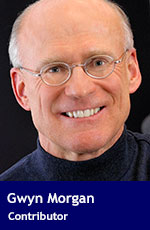We pay a significant cost for investing socially in ideas that can’t be supported by fact
 Humans have always believed in myths, despite evidence that shows those beliefs had no foundation in fact.
Humans have always believed in myths, despite evidence that shows those beliefs had no foundation in fact.
Sixteenth-century Italian physicist Galileo Galilei was convicted of heresy after he angered Pope Urban VIII by publishing telescopic observations supporting Copernicus’s theory that the Earth revolved around the sun, rather than the other way around. More than a century would pass before the church fully accepted his conclusions.
Given the immense expansion of knowledge over the ensuing centuries, plus the ubiquitous online access to that information, you would expect that erroneous ideas would have a very short lifespan. And yet, as a New Year dawns, the list of unfounded beliefs seems to lengthen, not shorten. Here are three myths that became even more pervasive in Canada over past year.
|
|
| Related Stories |
| Danielle Smith’s first challenge will be to fix Alberta healthcare
|
| Canada cannot afford to lose more doctors
|
| There’s a better way to lower price of medicines
|
• Deficit spending makes people better off. Look no further than Europe to see the folly of this. Deficit spending means borrowing money. And as debts rise, investor confidence falls. This leads to lower credit ratings, which translate into higher interest costs, leaving governments with no choice but to adopt severe austerity budgets that slash social programs.
This scenario played out in Canada from 1968 to 1984, when Pierre Trudeau was prime minister. Public spending rose from 30 to 53 per cent of GDP, driving the federal deficit to over $32 billion ($66 billion in 2015 dollars) and increasing the national debt by more than 700 per cent. Canada’s international credit rating collapsed, taking the Canadian dollar with it.
By 1981, Canada’s bank prime lending rate had reached an incredible 22 per cent, causing personal and corporate bankruptcies while stifling private investment. Canada was transformed from one of the world’s strongest countries financially into an economic basket case.
It would be two decades before tough fiscal discipline stabilized and began to reduce Canada’s real dollar debt.
• Canada has one of the world’s best healthcare systems. Year after year, international surveys show the opposite. A 2014 Commonwealth Fund report found the performance of our country’s healthcare system ranked well behind that of Australia, France, Germany, the Netherlands, New Zealand, Norway, Sweden, Switzerland and the U.K. And a 2013 Organization for Economic Co-operation and Development report found that, despite spending 36 per cent more per capita, Canada has the longest wait times for elective surgery.
Tellingly, Canada is the only country that forbids access to private alternatives to our overwhelmed and underperforming monopolistic government system.
• Wind and solar power can lead to a fossil-fuel-free world. This is a prime example of the propensity for people to believe almost anything if you repeat it often enough. Nowhere was this tactic employed more vigorously than at the recent COP21 global warming conference in Paris.
But wishing and hoping for something doesn’t make it a reality. As Galileo famously said, “In questions of science, the authority of thousands is not worth the humble reasoning of a single individual.”
It doesn’t take an exceptionally gifted mind like Galileo’s to know that the sun doesn’t always shine and that, outside of the tropical latitudes, the days are too short and the sun angle too low to generate much solar power. Or that power cannot be generated at night when it is actually needed.
Similarly, the wind doesn’t always blow.
This unreliability requires solar panels and windmills to be backed up by other energy generation facilities and these are mainly driven by fossil fuels. Adding to those realities is the fact that wind and solar facilities are fiendishly expensive. That has been demonstrated by Ontario’s disastrous green power subsidy, which more than doubled power rates while yielding small amounts of energy. Likewise in Germany and the U.K., where despite hundreds of billions in publicly-funded subsidies, wind and solar power have resulted in a tiny, unreliable source of electricity.
Believing in some myths has little societal impact. But when these beliefs are widespread enough to influence our country’s financial stability, healthcare or energy supplies, they can do real harm.
Canadians would be wise to seek out truths rather than believing the myths spouted by those whose sole purpose is to advance their own agendas.
Gwyn Morgan is a retired Canadian business leader who has been a director of five global corporations.
For interview requests, click here.
The opinions expressed by our columnists and contributors are theirs alone and do not inherently or expressly reflect the views of our publication.
© Troy Media
Troy Media is an editorial content provider to media outlets and its own hosted community news outlets across Canada.

